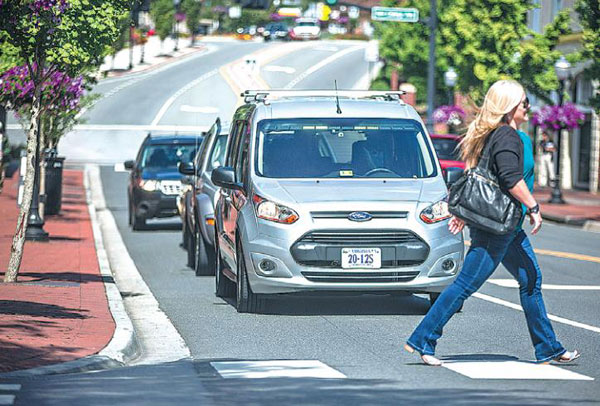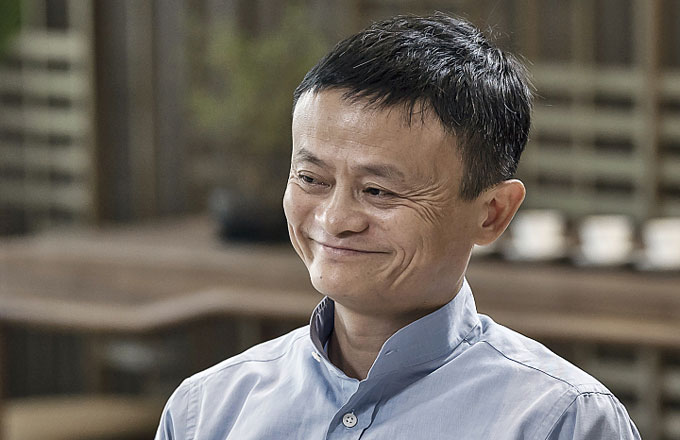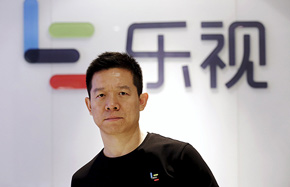Science fiction becomes fact as autonomous cars hit the roads
 |
|
A road test conducted by Ford to find out what signals work best between autonomous cars and pedestrians. [Photo provided to China Daily] |
Autonomous cars are gradually driving out of science-fiction books into reality-as auto part suppliers, automakers and dotcom companies come up with continuously updated solutions.
Continental AG is working on a highly automated driving function called Cruising Chauffeur.
Ready for production in 2020, the function gives vehicles the ability to take over the driving task on highways in accordance with traffic regulations, and the system will alert the driver to take over driving again at the end of the stretch of highway.
The German company said even if the driver fails to respond when prompted to take over-for health reasons, for example-the vehicle is automatically able to stop safely.
Continental started testing highly automated systems such as this on public roads back in 2012 in the United States' Nevada.
The technology company now has a global fleet of development vehicles in Germany, the US, Japan and China.
French carmaker Renault Group will make available its highly autonomous driving technology by 2018.
The Renault Nissan and Mitsubishi Alliance has a plan to launch more than 40 models by 2020, capable of different levels of autonomous driving, including eyes-off, hands-off and even minds-off.
Renault said it will join hands with Chinese partners on autonomous driving as the brand pins great hope on the Chinese market.
Chinese car users have a tradition of having a long drive back home during holidays and the authorities are mulling an intelligent connected vehicle development road map, according to Jacques Foulquier, Dongfeng Renault's vice-president responsible for research and development.
GM CEO Mary Barra said the carmaker is planning to introduce its Cadillac models with Super Cruise functions into the Chinese market.
According to Boston Consulting Group, China is expected to have a fleet of 8.6 million autonomous cars of different levels by 2035, the largest in the world.
The US-based consulting firm found 76 percent of Chinese are open to riding in autonomous driving vehicles, higher than the global average of 58 percent.
Chinese companies are accelerating their pace of development on autonomous driving technologies.
In late August, JAC Motors said it will produce autonomous cars with the country's internet giant Baidu Inc, with the first mass-produced model scheduled to roll off the assembly line in 2019.
By then the models will be technologically prepared for hands-off autonomous functions.
The agreement came within two months of Baidu's launching its Apollo plan, which aims to provide open, comprehensive, and reliable software for the development of autonomous vehicles.
Baidu will offer a comprehensive solution that covers high-definition maps as well as location, sensing, planning and decision-making technologies.
Chinese carmakers Changan Automobile, Geely Automobile and GAC Motor are working with NXP Semiconductors, a top global chipmaker, on self-driving technology.
Autonomous driving technology means more than driving itself, and some are bracing themselves for more potential problems. Black-Berry Ltd is helping Delphi Automotive PLC to improve the safety of its autonomous driving software, according to a deal the two signed recently.
In 2019, Delphi is to launch its fully integrated automated driving solution, called Centralized Sensing Localization and Planning, and the Black-Berry QNX OS for Safety will facilitate Delphi's proprietary Ottomatika software algorithms and middleware, to enhance performance and safety.
"There is no safety without security," said John Wall, senior vice-president of Black-Berry QNX, in a news release.
"With cyber attacks and threats to connected vehicles on the rise, it is imperative that auto manufacturers are provided with software that is safety certified, reliable and secure," he said. Ford is testing what signals work best between autonomous cars and pedestrians.
It is also working on ways to communicate with those who are blind or visually impaired as part of a separate work stream.
A common visual communications interface most people can understand across all self-driving vehicles in all locations will help ensure safe integration into transportation systems, the US carmaker said.
"We need to solve for the challenges presented by not having a human driver, so designing a way to replace the head nod or hand wave is fundamental to ensuring the safe and efficient operation of self-driving vehicles in our communities," said John Shutko, Ford's human factors technical specialist.

























